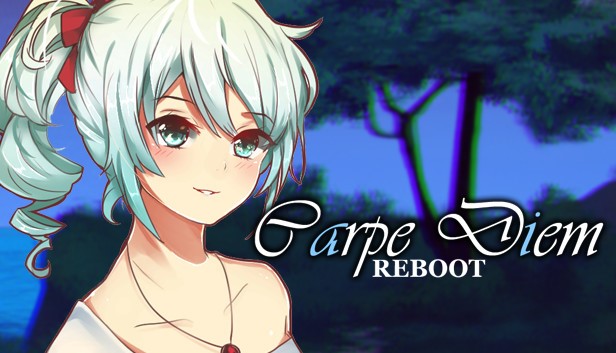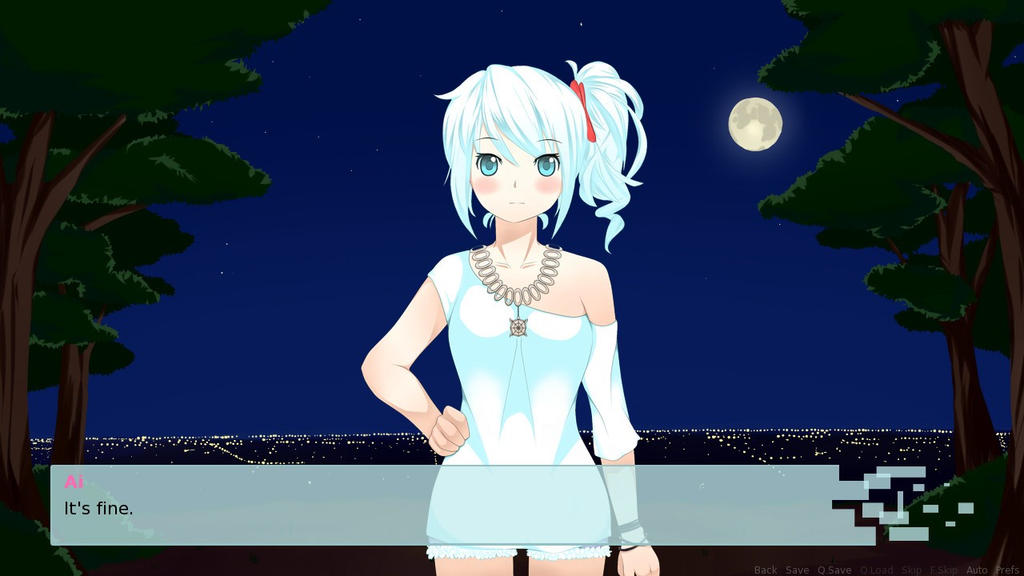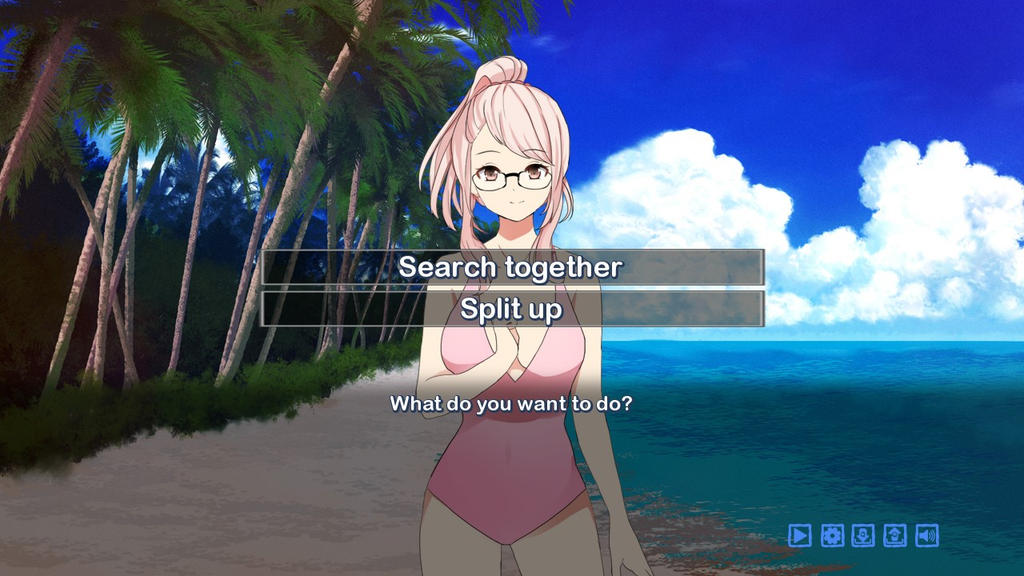
This review was originally posted on Fuwanovel Forums on January 5th 2018.
Warning: Heavy spoilers ahead! If you want to play this VN yourself, stop reading now.
As much as I’m a fan of independent VNs and appreciate the possibilities that crowdfunding opened for the Western visual novel market, it’s not completely rare for these projects to end with spectacular disappointment, for various reasons. Carpe Diem: Reboot is an especially interesting example of a visual novel that ultimately failed to live up to the expectations, but not because of lack of effort or poor production values, but through the sheer “virtue” of really bad writing. As I’ll be treating this as a case study of how to utterly waste a good concept and a lot of work, unlike my normal reviews, I’ll be revealing many major plot-points, including some details of the games’ endings. As Reboot mostly relies on its plot twists and mystery elements to keep the player interested, if you want to play it yourself, ignore this review or read it after you’ve completed the game.
While the title we’re talking about was released on Steam in September 2017, after a successful Kickstarter campaign, its history starts a bit earlier, with a free VN from late 2015 simply titled Carpe Diem. This very short, but nicely written visual novel served both as a prologue of sorts and an advertisement for the crowdfunding effort which later spawned Reboot. In it, a simple story about two friends (lovers?), Jung and Ai, deciding how to use a rare opportunity to spend a full afternoon together, ended with a twist – the girl was actually a computer program, an object of delusional love of a shut-in trying to escape from his real life. The Steam achievement for reaching the end of the game, “What are you doing with your life?”, served as a somewhat ironic punchline, making clear the main themes the author tried to tackle. Good dialogues and decent execution of Carpe Diem, while in no way breath-taking, definitely showed promise and made many people (including me, although I've discovered it after the Kickstarter campaign was already over) somewhat enthusiastic about its continuation. So, what went wrong?

The prologue game, while very minimalistic, showed enough promise to interest people and mobilize support for the Kickstarter campaign – at the very least, it was a brilliant piece of marketing
Reboot picks up exactly where the first game ended, that is at the scene of Ai revealing that she’s "not real". We’re soon introduced to the initial portion of drama – she’s a sentient A.I., created by a shut-in programmer, who uses her to earn money by forcing her to take on freelance programming jobs (as she can do them at an insane speed, he’s already got quite rich off her back). Jung, Ai’s creator and our protagonist, quickly proves to be one of the most apathetic and irritating characters I’ve ever seen in VNs – a supposed genius, who absolutely lacks any initiative and during the whole story pretty much follows other characters around and occasionally provides bland exposition. The reasons behind his awful attitude and passiveness are somewhat explained by the end of the story, but doesn’t change the fact he’s an atrocious lead character, never showing any of his supposed skills and virtues. Ai, on the other hand, acts with light-heartedness and cheerfulness of a child, losing the sarcastic edge that made dialogues in the prequel amusing. However, there’s a definite bond between the two, made problematic by one fact – Ai is “dying”, her programming slowly deteriorating and limiting her activity to smaller and smaller periods of time.
As a starting point, it’s not an awful piece of storytelling – already we can tell that something’s off in Jung’s behaviour and what’s happening doesn’t really add up (what’s the problem with Ai? Why there’s no backup of her program? Why can’t it be fixed?). The resolution of this part of the story, however, breaks any possibility to treat this VN seriously. Ai, knowing she has little time left, promises to bring Jung one last present for his birthday. She sets up a workplace in a corner of the room, buys two robotic arms and various stuff over the internet and creates… A human body for herself. Not a mechanical body. Not an android. A fully functional, human body, only “with a CPU instead of a brain – because the brain is hardest to replicate".

The first plot twist, while surprising, is so ridiculous that it’s hard to maintain any suspension of disbelief. From there, it mostly gets worse…
Well, let’s take a deep breath, because this is not where the fun ends. At some point in the first chapter of the game we learn that Jung likes a certain bakery, where he regularly meets a female employee – as it’s a voiced character, we already know she’ll be important. After the first plot twist, he goes there again, taking with him his near-human A.I. companion and thanks to Ai’s straightforwardness and urge to make friends, gets to know the cashier, whose name is Yume. Soon after they learn that Yume is actually one of the best programmers in the world (of course!), and Ai’s rival on freelance programming website she used to make money. Not long after that, Jung somewhat suddenly announces that he was a part of some Illuminati-style secret society and also is a murderer (although pretty much no one cares or even mentions it later), and Ai’s programming is based on some kind of “weaponized software”, created by the evil-splinter-group-leader he had to kill, to prevent him from taking over the world. So, soon the government will be after him and Ai, as her existence is considered a threat. Admittedly, there are some cute, enjoyable slice-of-life moments between the "story development", but they only make the stupidity of the plot that much more obvious and irritating, as every major event immediately takes you out of the experience.
However, all these insane plot developments soon lead us to a final decision, which can produce two possible outcomes. In the first one, the protagonist sends Ai and Yume away, to protect them from their pursuers and covers all the tracks behind them. This scenario is concluded with a scene of him standing on a cliff, which suggests that he might have ultimately committed suicide to make sure no one ever finds Ai, but leaves the details to our imagination. This is, however, a non-canon “good” ending. The “true ending” involves Jung trying to confess to Yume, saying that they should sell-off Ai to the government and be together, being harshly rejected as a spineless coward he is, going crazy and murdering Ai (although she later “reboots”, foreshadowing a possible sequel). While I’m not on principle against sad/depressing endings, this establishes Jung as most likely one of the most pathetic characters in the history of visual novels and makes the whole experience, as over-the-top silly as it already was, ultimately distasteful and pointless. The authors definitely went for shock value, but only with a partial success, considering how disconnecting and irritating most major plot-points in the story already were. What could’ve been an interesting tale about the nature of life and the things that make someone truly human (these questions are seriously present in the story), ended up as a kitsch mess, memorable mostly by the virtue of its writing mistakes and ability to make the reader miserable.

The production qualities of the game are beyond what you would expect from this kind of indie project, but they couldn’t possibly save it from being a general disappointment.
What makes this truly sad is the contrast between the storyline and the general production quality of the game. While visually it’s mostly just decent, with everything being pleasing to the eye but not in any way exceptional, there’s one thing that definitely makes it stand out from most western VNs – it has high-quality, full voice acting. Actresses voicing Ai and Yume, for the most part, do a great job, while the supporting cast, usually being the place where this kind of productions fall in quality dramatically, is all very much acceptable. Even the casual dialogues, the personalities of the girls and the pacing of the story aren’t awful – they’re simply quite insignificant when confronted with sheer stupidity and pretentiousness of the overarching storyline.
Carpe Diem: Reboot is a story of wasted potential – of easily avoidable mistakes, that more or less killed a project which had everything necessary to succeed in a rather spectacular way. Even as it is now, it’s easy to realize the authors’ dedication, hard work put into the game and traces of genuine talent, which with help of a few beta readers or better thought-through development process could produce a memorable, interesting game. What we got, in reality, is a rather spectacular flop, which should be taken as a warning by anyone interested in creating original VNs, and probably any kind of story-driven game. And unless you’re really interested in finding out for your own “if it’s really that bad”, I don’t recommend playing it – there might be a way to find humour in its flaws, but it will ultimately be a waste of your time.
Final Score: 2/5
Pros:
+ Interesting premise
+ Decent art
+ Good voice acting
Cons:
- Ridiculous, over-the-top writing
- Repugnant, useless protagonist
- Pointlessly disturbing “true ending”
VNDB page
Buy Carpe Diem: Reboot on Steam

No comments:
Post a Comment
Note: only a member of this blog may post a comment.